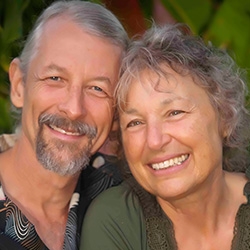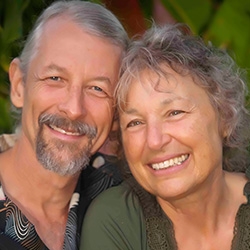

Search Results: vulnerability
-
Come. Let us journey together into our own authentic Life force: the essential living energy that permeates all of our lives.
Your journey will begin at the center: with the divine / life force, or soul force.
Robert Gonzales shares how this fundamental life energy is the tender expression of your inner being, or soul. It unfolds through the heart as your deepest longings, which manifest themselves in all forms of human needs and values. When you live from the energies of compassion, creativity, love, and clarity – while remaining wholly grounded and aware of needs and values – then you are living your passion… You are living the Self-In-Life.
-
Expressing ourselves honestly is sometimes scary because we can't predict where the conversation will go after we've made ourselves vulnerable. This recording will demonstrate how the power of our honesty is enhanced by ending on a clear and present request.
-
When someone responds with painful sarcasm, criticism, or dismissal you can respond with empathy, or with clarity about your intention, need and request. If you're unable to do this, later you can privately write what they said, identify the feelings and needs of both of you, then write possible responses. This can help you remember to stay with your intention and what’s true for you without getting caught in defensiveness or reactivity.
-
Enjoy listening in as Arnina assists participants in fine tuning what they wish for their futures, and what practices they intend to embrace as the course winds down. She also offers strategies for what they can do if they forget their intended practice, and revisits the importance of untangling Needs from Core Belief.
-
During this very moving session, you'll dive into Robert's exercises for supporting connection to your true self as opposed to your conditioned self.
-
Through your dialogues at home, where the stakes are often very high, you can increase your ability to meet the challenges of life everywhere with empathy, goodwill and authenticity. Please listen to this inspiring recorded telecourse with Miki Kashtan and learn how!
-
- Learn how to transform NVC into a tool for systemic awareness and healing
- Examine the influence of difference, and uncover pathways that strengthen its capacity
- Learn to receive and offer feedback on impact in situations fraught with power differences
- Explore specific ways in which NVC systemically supports the full flowering of humanity
- Delve into the dynamics of cultural differences, and discover how NVC can systemically contribute to a liberation perspective
-
- Deepen your capacity for self-acceptance and self-compassion
- Bring greater compassion to your relationships
- Increase your capacity for vulnerability and mourning
- Enhance your sense of trusting your own place in life, as well as your purpose
-
Learn to speak NVC using your own voice and increase ease and flow in all your personal and professional conversations. This 7-session telecourse recording with renowned trainer Miki Kashtan is designed to help you integrate NVC into all aspects of your life by gaining fluency in your practice of NVC and by embodying the principles regardless of the words you use. This course is based on intensive practice and coaching with real-life examples from participants’ lives.
-
- Do you know what is yours to do in response to our growing global crises?
- Is nonviolence woven as deeply as you want it into how you live and lead?
- Have you ever experienced what it’s like to participate in an interdependent web of mutual support to fully embody our commitments?
- Are you familiar with how to bring yourself back again and again to aligning with purpose in every moment?
- Do you see yourself as part of transforming the legacy of scarcity, separation, and powerlessness into a livable future?
-
If you are tired of feeling dissatisfied, frustrated and hopeless about experiencing ease and joy in your intimate relationships, this course is for you! Please join CNVC Certified Trainer and long-time relationship expert, Kelly Bryson, in this course to rethink and relive your perception of love so you can actually feel love, let love in and be love.
-
- Share NVC in a way that keeps your group engaged
- Walk away with practical facilitation tips and 5 session outlines
- Know how to respond to nay-sayers
- Learn how to promote your work
-
Veteran Trainer Sylvia Haskvitz reviews the key distinctions/differentiations in NVC.
-
Ask the Trainer: Guidance for NVC groups on when and how to make requests, especially negative ones.
-
This explores four types of feedback: destructive, constructive, by demonstration, and dialogue.
-
Why is it so difficult to change our patterns even when we want to, even when we experience shame or despair about them? Arnina Kashtan offers some of the common pitfalls and concrete steps to overcome them in the future.
-
This 4 session telecourse recording offers practices while exploring the relationship between the core elements of NVC and universal spiritual principles.
-
Are you a spiritual seeker who longs for an approach that supports compassion for self as well as profound spiritual transformation? If so, you’ll enjoy this telecourse recording with Robert Gonzales and Leo Sofer as they engage in dynamic discussions about NVC as a spiritual practice.
-
Jori and Jim Manske offer a process they call "The Zero Step," encompassing the characteristics of warmth toward self and other, care for the vitality of both yourself and other(s), wonder/interest, vulnerability and empathy, which leads directly to connection requests and an openness to outcome.
-
How do you know when you’re projecting disowned parts or replaying old relationship dynamics? It’s hard to know for sure, but if you find yourself upset or shutting down and unable to have a dialogue in which you can speak clearly about your feelings and needs and empathize with the other’s feelings and needs, there is likely a projection. The stronger your reaction, the more likely you are projecting.

Quick Links
Subscription Preferences
Stay In Touch!
Looking for ways to keep up with NVC Academy news, get special offers, free resources, or words of inspiration? Here are five ways to stay engaged:




















